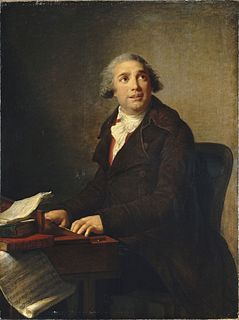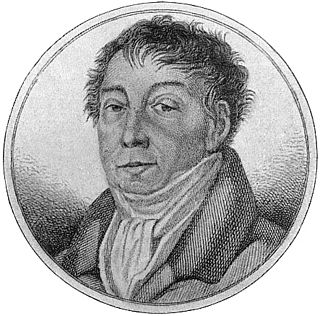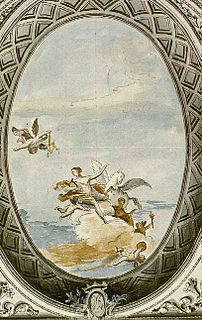
Giovanni Paisiello was an Italian composer of the Classical era, and was the most popular opera composer of the late 1700s. His operatic style influenced Mozart and Rossini, and his music was championed by Haydn and Beethoven.

Jean-François Marmontel was a French historian, writer and a member of the Encyclopédistes movement.

Carlo, Count Gozzi was a Venetian playwright and champion of Commedia dell'arte.

Luigi Marchesi was an Italian castrato singer, one of the most prominent and charismatic to appear in Europe during the second half of the eighteenth century.

Giuseppe Gazzaniga was a member of the Neapolitan school of opera composers. He composed fifty-one operas and is considered to be one of the last Italian opera buffa composers.
Ignaz Jakob Holzbauer was an Austrian composer of symphonies, concertos, operas, and chamber music, and a member of the Mannheim school. His aesthetic style is in line with that of the Sturm und Drang "movement" of German art and literature.
Angelo Tarchi was an Italian composer of numerous operas as well as sacred music. Between 1778 and 1787, he worked primarily in Italy, producing five or six new operas each year.

Johann Gottlieb Naumann was a German composer, conductor, and Kapellmeister.
Giovanni Bertati was an Italian librettist.

The Teatro San Moisè was a theatre and opera house in Venice, active from 1620 to 1818. It was in a prominent location near the Palazzo Giustinian and the church of San Moisè at the entrance to the Grand Canal.
Gennaro Astarita was an Italian composer, mainly of operas. The place of his birth is unknown, although he was active in Naples for many years. He began his operatic career in 1765, collaborating with Niccolò Piccinni in the writing of the opera L'orfana insidiata. He became the maestro di cappella in Naples in 1770.
Rinaldo di (da) Capua was an Italian composer. Little is known of him with any certainty, including his name, although he was known to Charles Burney. He may have been the father of composer Marcello Bernardini.
Marcello Bernardini was an Italian composer and librettist. Little is known of him, save that he wrote 37 operas in his career. His father was most likely the composer Rinaldo di Capua.
Giovanni Battista Lorenzi was an Italian librettist. He was born in Puglia and died in Naples and was a friend of Giovanni Paisiello, with whom he collaborated on numerous operas.
Antonio Boroni was an Italian composer.

Bonaventura Furlanetto was an Italian composer and music teacher, also known in his lifetime by the nickname Musin. His pupils included Anselmo Marsand and Giovanni Pacini.







